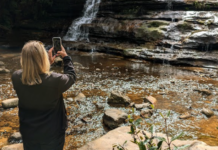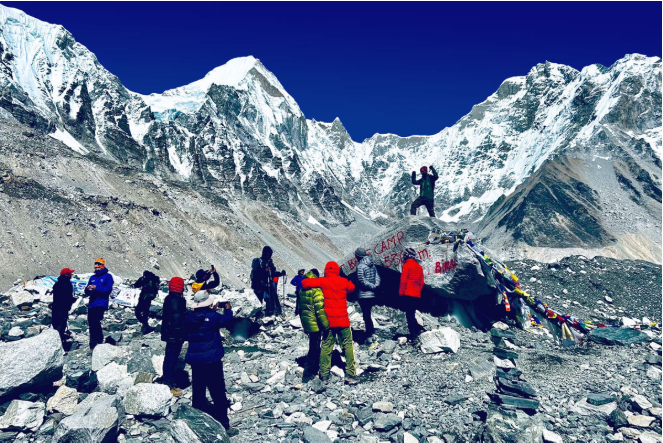The Everest Base Camp tour is one of the most iconic travel experiences on Earth. Nestled in the heart of the Himalayas, this legendary trek takes adventurers through stunning alpine scenery, ancient Sherpa villages, and sacred Buddhist monasteries, culminating at the base of the world’s highest peak—Mount Everest (8,848.86 meters). Whether you’re a seasoned trekker or a passionate explorer, Everest Base Camp tour packages offer a life-changing opportunity to stand in the shadows of giants and witness the raw beauty of nature.
Why Choose the Everest Base Camp Tour?
Unlike typical sightseeing vacations, the Everest Base Camp tour is a journey into the soul of the Himalayas. It is not just about the destination but the immersive experience of getting there.
1. Breathtaking Scenery
From the moment you land in Lukla—home to one of the world’s most thrilling airstrips—you’re surrounded by towering peaks like Ama Dablam, Lhotse, and of course, Everest. The trail winds through forests of rhododendron and pine, across icy rivers, and over high suspension bridges with panoramic views of snow-capped mountains.
2. Cultural Richness
The Khumbu region is a vibrant cultural tapestry. Trekkers visit ancient monasteries like Tengboche, interact with friendly Sherpa communities, and learn about local customs. Prayer wheels, fluttering prayer flags, and mani walls mark spiritual passages throughout the trail.
3. Personal Achievement
Reaching Everest Base Camp at 5,364 meters is no small feat. It requires physical endurance and mental strength. Standing there is a proud moment of personal accomplishment, whether you hike or opt for helicopter-assisted options.
Everest Base Camp Tour Packages
Everest Base Camp tour packages come in various formats to suit different budgets, timelines, and fitness levels. Choosing the right package is key to a successful journey.
1. Standard Trekking Package (12–14 Days)
Ideal for fit travelers seeking an immersive trek. Includes:
- Lukla flight
- Trekking guide and porter
- Accommodation in teahouses
- Meals during the trek
- Permits (TIMS & Sagarmatha National Park Entry)
2. Luxury EBC Tour
For those who prefer added comfort:
- High-end lodges with private bathrooms
- Professional guides with personalized service
- Meals with greater variety
- Option for scenic helicopter return to Kathmandu
3. Everest Base Camp Helicopter Tour (1 Day)
A non-trekking option for time-conscious or physically limited travelers. Features:
- Early morning helicopter flight from Kathmandu
- Aerial views of Everest, Lhotse, and Khumbu Glacier
- Breakfast at the Everest View Hotel
- Short landing at Kala Patthar for photos
4. Everest Base Camp with Gokyo Lakes or Cho La Pass
For the adventure-seeker:
- Combines the EBC trail with stunning detours
- Offers views of the turquoise Gokyo Lakes and remote valleys
- Demands higher fitness and longer itinerary (18+ days)
Everest Base Camp Tour Itinerary (Standard 14-Day)
Everest Base Camp Tour Itinerary Here is a well-paced itinerary suited for most travelers:
| Day | Destination | Altitude | Activities |
| 1 | Kathmandu to Lukla, then Phakding | 2,610m | Scenic flight, 3-hr trek |
| 2 | Phakding to Namche Bazaar | 3,440m | Enter Sagarmatha NP, cross suspension bridges |
| 3 | Acclimatization at Namche | 3,440m | Hike to Everest View Hotel |
| 4 | Namche to Tengboche | 3,860m | Visit Tengboche Monastery |
| 5 | Tengboche to Dingboche | 4,410m | Trek through alpine meadows |
| 6 | Acclimatization in Dingboche | 4,410m | Optional hike to Nagarjun Hill |
| 7 | Dingboche to Lobuche | 4,940m | View of Khumbu Glacier begins |
| 8 | Lobuche to EBC via Gorak Shep | 5,364m | Reach Everest Base Camp |
| 9 | Kala Patthar sunrise hike, then Pheriche | 5,545m | Best Everest view |
| 10 | Pheriche to Namche Bazaar | 3,440m | Return trek |
| 11 | Namche to Lukla | 2,860m | Final trek day |
| 12 | Fly Lukla to Kathmandu | 1,400m | Celebration day |
| 13 | Buffer/Rest Day | – | Extra day for flexibility |
| 14 | Departure | – | Fly home |
Best Time for Everest Base Camp Tour
- Spring (March–May): Clear skies, blooming rhododendrons, moderate temperature.
- Autumn (September–November): Peak season, best visibility, pleasant weather.
- Winter (Dec–Feb): Fewer crowds but freezing temperatures.
- Monsoon (June–August): Not recommended due to rain and flight disruptions.
Fitness & Preparation
While no mountaineering experience is required, the EBC tour is still a high-altitude trek. Preparation is essential:
- Begin training 2–3 months in advance
- Focus on cardio, endurance, and leg strength
- Consider altitude sickness medications like Diamox (consult doctor)
- Gear up with quality trekking boots, layers, and a down jacket
Unique Experiences on the Trail
- Namche Bazaar Saturday Market: A Sherpa trading hub
- Sagarmatha National Park Museum: Insightful exhibits on Everest
- Tea with Monks in Tengboche: A meditative moment
- Glacial Rivers & Icefalls: The roaring Khumbu Icefall is surreal
- Stargazing at High Altitudes: Clear Himalayan nights are unforgettable
Unique Conclusion
The Everest Base Camp tour is more than just a trek—it’s a transformational experience that combines nature, culture, and personal growth. Whether you’re choosing a classic trekking route or indulging in a luxurious helicopter return, each version of the journey offers its own rewards. The changing landscapes, resilient Sherpa communities, and the sheer majesty of Everest will leave an indelible imprint on your soul. The journey to Base Camp doesn’t just change your location—it changes your perspective. In the heart of the Himalayas, you’ll find not only the world’s highest peak but also your highest self.
Key Takeaways
| Point | Description |
| Location | Everest Base Camp, Khumbu region, Nepal |
| Ideal Duration | 12–14 days for standard trek |
| Tour Types | Standard trek, luxury tour, helicopter tour, extended routes |
| Best Seasons | Spring (Mar–May), Autumn (Sep–Nov) |
| Fitness Level | Moderate to high (altitude awareness required) |
| Cultural Insights | Rich Sherpa heritage and Buddhist influence |
| Unique Features | Panoramic mountain views, Everest close-up, remote monasteries |
| Altitude Range | 2,610m (Phakding) to 5,545m (Kala Patthar) |


















